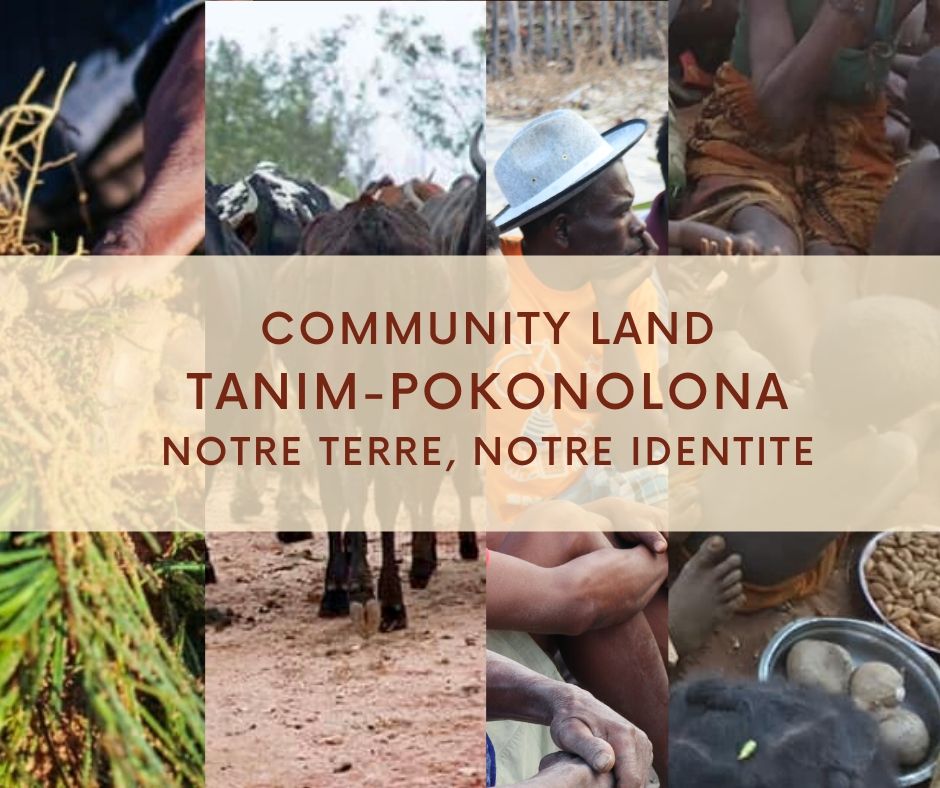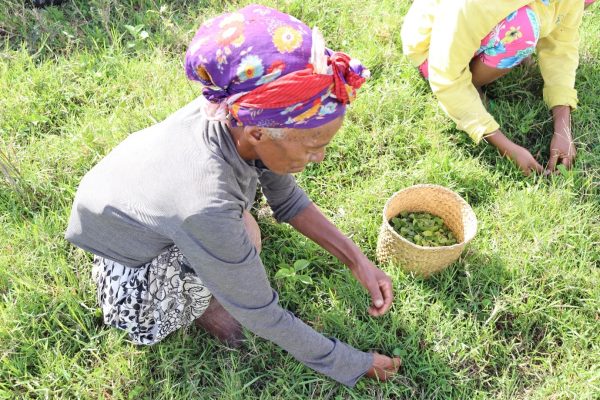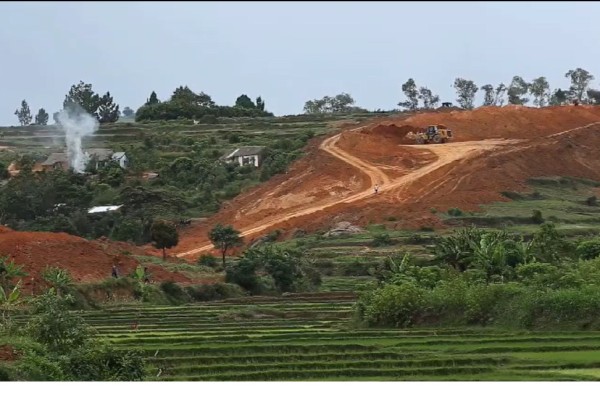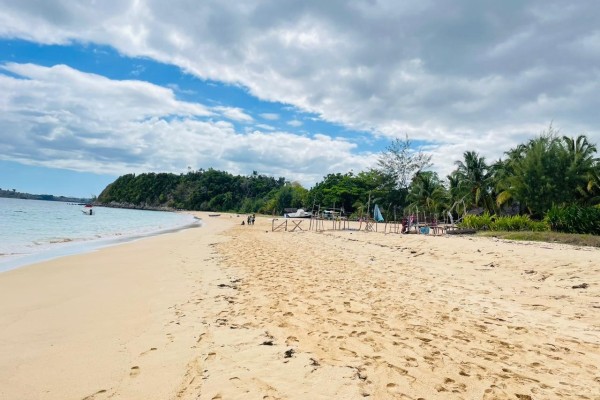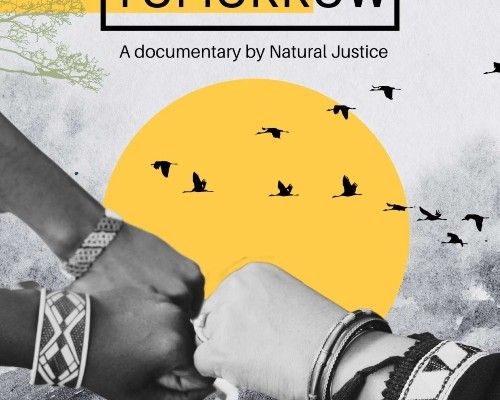Les terrains communautaires (tanim-pokonolona) sont un symbole des liens intimes et ancestraux des communautés locales Fokonolona avec leur terroir. A Madagascar, ces terrains font partie de ce qu’on appelle des terrains à statuts spécifiques. En ce sens, ils ne sont généralement pas classés parmi les formes habituelles de propriété foncière telles qui existent actuellement (privée ou publique). Leur sécurisation par voie légale est une opportunité de réaffirmer les droits des communautés sur leur terrain particulièrement face aux différentes initiatives d’investissement.
L’atelier national de démarrage initié par le Ministère de l’aménagement du territoire, de l’habitation et des travaux publics (MAHTP) en août 2019 a donné le ton pour initier les travaux pour aboutir à une loi sur les terrains à statuts spécifiques à Madagascar. Ces terrains, définis par la réforme foncière de 2005 mais dont le régime juridique n’a pas été détaillé, ont longtemps été la source de discussions et de litiges pour les utilisateurs et les propriétaires terriens. Parmi les terrains liés directement aux droits des communautés locales « Fokonolona » engagées dans la gestion de l’environnement figurent les terrains gérés et gouvernés coutumièrement par les communautés, les terrains sous transfert de gestion communautaire, les aires protégées, les réserves agricoles, entre autres.
L’immatriculation des terrains communautaires : un enjeu vital et historique pour les communautés locales Fokonolona Malagasy
Jusqu’à la période coloniale, la gestion coutumière des espaces et des terrains par les « Fokonolona » n’a pas posé de problème puisque ces biens leur appartenaient en vertu du droit coutumier reconnu et agréé par tous. Leur gestion était assurée collectivement sous la gouvernance d’institutions traditionnelles et à travers des conventions sociales, le plus souvent non-écrites.
La survenance de la colonisation a introduit le concept de domanialité qui a bouleversé cet ordre juridique, substituant le système de droit coutumier à un droit positif basé sur le système français. Dès lors, pour se prévaloir d’un droit de propriété, toute personne se devait d’immatriculer son bien auprès du service des domaines et obtenir un titre foncier correspondant. Ce système a été maintenu depuis l’indépendance sans pour autant que le système de droit coutumier ne soit effacé par le droit positif. Cette situation a été la source de nombreux conflits notamment entre « Fokonolona » et représentants de l’État sur la propriété de ces terrains. La période de l’indépendance a été marquée par la continuité de l’héritage colonial d’autant plus que le cadre juridique accordait de moins en moins d’importance aux « Fokonolona ». Malgré le fait que l’administration ait à quelques exceptions reconnu un titre de propriété aux « Fokonolona », ces dernières demeurent toujours dans l’expectative. En effet, la pratique du droit, même à l’époque contemporaine, tarde à reconnaître la personnalité juridique aux « Fokonolona ».
De précédents efforts dans la réforme du droit mais non-bénéfiques aux communautés
Des efforts législatifs tendant vers l’immatriculation de terrains au profit des « Fokonolona » ont été observés sans qu’ils n’aient atteint ce but. Depuis la fin des années 1990, la pression exercée sur l’environnement a convaincu l’État d’impliquer les communautés locales en recourant au transfert de gestion de ressources naturelles. Il ne s’agissait que d’une formalisation tacite d’une gestion coutumière déjà préexistante dans plusieurs cas.
Par ailleurs, le procédé offrait la possibilité d’effectuer une sécurisation foncière relative (SFR) de certains espaces pour reconnaître le droit de jouissance des communautés. Cet acte était initialement prévu être transformé en titre foncier en cas de réussite du transfert pour récompenser la bonne gestion. Les réformes foncières de 2005 n’ont hélas pas continué dans ce sens. En effet, la nouvelle législation rend possible l’immatriculation collective des terrains sous réserve qu’il ne s’agisse pas de terrains à statut particulier, ce qui semble a priori être le cas des terrains réclamés par la plupart des communautés. Cette situation a été exacerbée par l’absence de délimitation effective des terrains incorporés dans les aires protégées (terrestres ou marines) et le domaine forestier de l’État dont la gestion de certaines parcelles relève des communautés locales.
Le processus législatif sur les terrains à statuts spécifiques: une nouvelle opportunité de redéfinir le droit ?
Le processus en vue d’établir un cadre juridique sur les terrains à statut spécifiques s’annonce comme une aubaine pour les communautés locales « Fokonolona » dont les revendications sont plus que légitimes. En effet, le dernier rapport de l’IPBSE (https://ipbes.net/document-library-catalogue/ipbes710add1) éclaircit que les espaces naturels gérés par les peuples autochtones et communautés locales se dégradent généralement moins rapidement que les autres territoires. D’autant plus que les fonciers communautaires constituent des symboles de fierté, d’identité et des valeurs ancestrales Malagasy. Les revendications ne se fondent nullement sur une création de droit.
C’est plutôt une reconnaissance légale de ce qui existe et est perpétué de fait depuis des générations. Le processus est ainsi l’opportunité d’insister sur la prise en compte de la gouvernance coutumière du foncier dans le cadre juridique, de préciser le régime juridique propre aux terrains gérés par les communautés et enfin d’aboutir à leur immatriculation.
Les travaux sur ce projet de texte sont encore en cours et aussi bien la société civile que les représentés des communautés s’activent pour faire entendre leurs voix et défendre leur cause, notamment la sécurisation du patrimoine communautaire dans la voie de l’émergence du pays.
*********************
A look at the legislative process integrating community land rights in Madagascar
The community lands (tanim-pokonolona) are a symbol of the intimate and ancestral links of the local Fokonolona communities with their land. In Madagascar, these lands are part of what are called lands with specific status. In the sense, they are not classified among the usual forms of land ownership as they currently exist (private or public). Securing them by legal means is an opportunity to reaffirm the rights of communities on their land, particularly in the face of various investment initiatives.
The national workshop initiated by the Ministry of Land, Housing and Public Works (MAHTP) in Madagascar in August 2019 set the tone for initiating work to produce a law on land with specific statutes in the country. These lands, which were defined by the 2005 reform of land, but whose legal regime has not been detailed, have long been the source of discussions and disputes for land users and owners.
Among the lands directly related to the rights of local “Fokonolona” communities involved in environmental management, are lands customarily managed and governed by the communities, lands under community management transfer, protected areas and agricultural reserves; among others.
Community land registration: a vital and historic issue for local communities Fokonolona Malagasy
Until the start of the colonisation period in Madagascar, the customary management of spaces and land by the “Fokonolona” did not pose a problem since these properties belonged to them by virtue of customary law recognized and agreed upon by all. Their management was carried out collectively under the governance of traditional institutions and through social agreements, most often unwritten.
The advent of colonization introduced the concept of “domainality”, which overturned this legal order, substituting the customary law system for positive law based on the French system. From then on, in order to claim a right of ownership, all persons had to register their property with the estate service and obtain a corresponding land title. This system has been maintained since independence without, however, the customary law system being erased by positive law.
This situation has been the source of many conflicts over the ownership of this land, particularly between “Fokonolona” and State representatives. The period of independence was marked by the continuity of the colonial legacy, especially as the legal framework gave less and less importance to the “Fokonolona”. In spite of the fact that the administration has, with a few exceptions, recognized a title of ownership to the “Fokonolona”, they still remain in a state of expectation. Indeed, the practice of law, even in the contemporary era, is slow to recognize the legal personality of the “Fokonolona”.
Previous efforts in law reform that did not benefit the communities
Legislative efforts towards the registration of land for the benefit of the “Fokonolona” have been observed without achieving this goal. Since the late 1990s, pressure on the environment has convinced the State to involve local communities through the transfer of natural resource management. This was merely a tacit formalisation of customary management that already existed in several cases. Furthermore, the process offered the possibility of carrying out relative land tenure security (SFR) in certain areas, in order to recognise the communities’ right of use.
This act was initially intended to be transformed into a land title in the event of a successful transfer, on order to provide for good management. Unfortunately, the 2005 land reforms did not continue in this direction. Indeed, the new legislation makes it possible to register land collectively provided that it is not land with special status, which seems a priori to be the case for land claimed by most communities.
This situation has been exacerbated by the lack of effective demarcation of land incorporated into protected areas (terrestrial or marine) and the State forest estate, some of whose plots are managed by local communities.
The legislative process on land with specific statutes: a new opportunity to redefine the law?
The process to establish a legal framework on lands with specific status is shaping up to be a godsend for the local “Fokonolona” communities whose claims are more than legitimate.
Indeed, the latest IPBSE report (https://ipbes.net/document-library-catalogue/ipbes710add1) clarifies that natural spaces managed by indigenous peoples and local communities generally degrade less rapidly than other territories. All the more so as community lands are symbols of pride, identity and Malagasy ancestral values.
Claims are by no means based on a creation of law. Rather, it is a legal recognition of what exists and has been de facto perpetuated for generations. The process is thus an opportunity to insist that customary land governance be taken into account in the legal framework, to specify the legal regime specific to the land managed by the communities and, finally, to lead to its registration.
Work on this draft text is still in progress and both civil society and community representatives are working to make their voices heard and defend their cause, in particular the securing of community heritage on the road to the emergence of the country.

